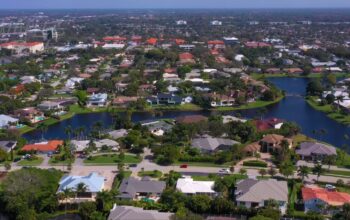Investing in Florida real estate has become a highly sought-after opportunity for both local and global investors, including those linked to European casinos. The state boasts a range of benefits, such as a tax-free environment, steady economic growth, desirable neighborhoods, and robust infrastructure. However, to ensure a successful investment, it’s essential to not only recognize the rewards but also understand the potential risks. This article will explore the critical factors you need to consider before making a property purchase in Florida.
Advantages of investing in Florida real estate
- No Personal Income Tax
Florida is one of the rare U.S. states that does not impose a personal income tax, which makes it an appealing choice for investors. Property owners enjoy the advantage of rental and sales income being untaxed, though property taxes remain in effect. This tax-free income environment significantly boosts Florida’s attractiveness, particularly for long-term investors aiming to maximize their returns.
- Attractive Property Tax Rates
Florida’s average effective property tax rate is around 0.74%, considerably lower than many other states where rates can exceed 1.5%. Additionally, tax incentives like the Homestead Exemption, which offers a tax break for homeowners occupying the property as their primary residence, can reduce the overall tax burden, making Florida even more appealing for investors.
- Economic Growth and Stability
Florida’s economy extends far beyond its iconic beaches and tourism. The state is seeing consistent growth in key sectors such as technology, healthcare, finance, and more. This broad economic foundation drives housing demand across both large urban centers and smaller regions, making real estate investment not only profitable but also a promising opportunity for the future.
- High Demand for Rentals
Florida’s reputation as one of the top tourist destinations globally ensures a high demand for rental properties. Many visitors seek short-term rentals, while the state also attracts retirees and professionals relocating for corporate positions, creating consistent demand for long-term rental properties. This makes Florida’s rental market consistently strong and lucrative for real estate investors.
Where is the best place to invest in real estate in Florida?
Florida offers a wide range of cities and regions to suit different investment goals and budgets. Below are some of the most popular destinations for real estate investors:
- Miami, the cultural and financial epicenter of Florida, serves as a global hub for tourism and international business. The real estate market remains stable here, even during fluctuations in other parts of the U.S. Investors can explore both residential and commercial opportunities, though property prices in Miami tend to be higher than in other areas of the state.
- Orlando. Famous for attractions like Disney World and Universal Studios, Orlando draws millions of visitors each year. However, it’s not just a prime spot for short-term rentals—Orlando is quickly emerging as a business center, with growing sectors such as healthcare, technology, and education. This makes Orlando an excellent choice for long-term real estate investments.
- Tampa’s real estate market is gaining popularity due to its affordable property prices and strong growth potential. The city is attracting people from other states, thanks to its excellent infrastructure and expanding real estate market, positioning it as a solid investment opportunity for those looking to capitalize on its future growth..
- Jacksonville. As Florida’s largest city on the Atlantic coast, Jacksonville offers relatively affordable real estate options. It is also one of the state’s fastest-growing cities, making it an appealing choice for long-term investors looking to tap into the city’s expanding market.
Types of real estate investments in Florida
Florida presents a variety of real estate investment options, catering to different investor preferences and risk tolerance. Here are some of the most common types:
- Rental Properties
Rental investments are one of the most popular ways to earn income from real estate. With Florida’s high demand for rental properties, especially in tourist destinations and major urban centers, this option is highly attractive. Investors can choose between long-term and short-term rentals, with short-term rentals in tourist-heavy areas often yielding higher returns.
- Fix-and-Flip
The fix-and-flip strategy is suited for experienced investors who purchase properties in need of renovation, improve them, and then sell for a profit. While Florida’s housing market is stabilizing, areas with ongoing development and rising prices still present profitable opportunities for flipping homes.
- Commercial Real Estate
For those interested in business-focused investments, commercial real estate—such as office buildings, retail spaces, and warehouses—can provide a reliable income stream. Major cities like Miami and Orlando, with their thriving business sectors, continue to offer strong demand for commercial properties.
- REITs (Real Estate Investment Trusts)
For a more passive investment approach, REITs are a great option. These companies own or manage real estate and offer public shares, allowing you to invest in the market without having to manage properties directly. REITs provide a way to earn income from real estate while participating in the stock market.
Risks in Florida real estate investing
While Florida offers many advantages for real estate investors, it’s important to consider the potential risks involved:
- Natural Disasters
Florida is prone to natural disasters, such as hurricanes, floods, and severe weather events. These can significantly impact property values and increase insurance premiums, especially in high-risk areas. When investing, it’s important to factor in these potential costs and evaluate whether properties in disaster-prone zones are a viable long-term investment.
- Economic Fluctuations
Like any other market, Florida’s real estate sector is susceptible to wider economic shifts. Factors like changes in oil prices or other macroeconomic events can influence property values and rental demand. Staying up-to-date with economic trends and adapting to market changes is essential for managing investment risks.
- Market Overheating
Florida, like other regions experiencing rapid property price growth, faces the risk of a market overheating. If property prices rise too quickly, they may become unaffordable for many buyers, potentially reducing demand. This could lead to a market correction or decline, so it’s important for investors to assess whether current property prices are sustainable in the long run.
How do I get started investing in real estate in Florida?
To kick off your real estate investment journey in Florida, follow these essential steps:
- Get Informed and Research the Market
Begin by gaining a solid understanding of local market trends and the unique characteristics of different Florida regions. Look into property prices, rental demand, and economic factors to pinpoint the best investment opportunities.
- Determine Your Goals
Clarify your investment objectives—whether you’re aiming for rental income, property flipping, or investing in commercial real estate. Defining your goals will help streamline your investment approach and ensure focus.
- Develop a Financing Strategy
Explore various financing options, including mortgage loans, private equity, or other funding sources. Ensure that your budget aligns with your chosen investment strategy and that you’re comfortable with your financial plan.
- Use Professionals
Partner with local real estate agents, attorneys, and financial advisors to reduce risks and improve your chances of securing a favorable deal. Their expertise will help guide you through the process smoothly.



